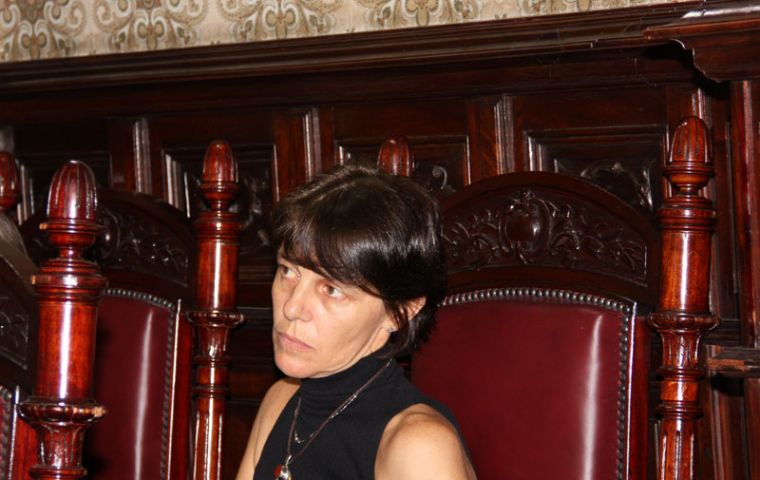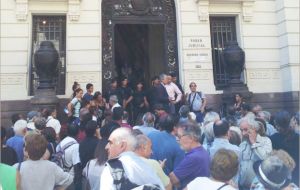MercoPress. South Atlantic News Agency
Human right activists in Uruguay storm the Supreme Court to protest judge’s transfer
 The controversial magistrate Motta abandons the Supreme Court
The controversial magistrate Motta abandons the Supreme Court The Uruguayan police evicted dozens of protestors that during three hours occupied the seat of the Supreme Court to impede the transfer of a magistrate, closely linked to human rights cases, from the criminal to the civil forum. Magistrate Mariana Mota has dealt with some of Uruguay’s most notorious human rights cases dating back to the twelve years of military dictatorship, (1973/1985).
Friday mid-morning an estimated 300 demonstrators convened by human rights groups, trade unions organization, and university students and other groups such as Mothers and relatives of detained and disappeared, gathered outside the unguarded Supreme Court building and just before the 11:00 o’clock ceremony for Magistrate Mota, stormed and occupied the building impeding the event.
However a few hours later the police forces convinced the protestors to peacefully abandon the premise while outside the other demonstrators insulted, pelleted, spat and provoked the forces. A few minutes later Judge Mota surrounded by relatives and friends abandoned the Court building following the confirmation of her new job, which under Uruguayan court law system represents an advance.
This is the first time in Uruguayan history that an event of this nature occurs at the Supreme Court, which left public opinion quite shocked with then circumstances filmed live.
“This looks more like the rule of the mob instead of the rule of the law”, said opposition Senator Jose Amorin Batlle.
Nevertheless Magistrate Mota’s case has not been without controversy, given an issue that remains highly sensitive because despite protests from certain human rights groups, in two referendums, in 1989 and 2009 the Uruguayan electorate, under different governments, voted to support a bill which drops the State’s punitive pretension against the alleged perpetrators of human rights, on bosh sides: the military and police forces, and the armed guerrillas.
Earlier in the week and in anticipation of the Friday ceremony Supreme Justice Minister Jorge Chediak supported the transfer of Magistrate Mota given her record.
“She had several yellow cards; it was a matter of time” said Justice Chediak. In May 2011, Mota participated in the March of Silence which every year is commemorated in Montevideo in the month of May during which thousands turn out with candles and posters in silence to remember and honour those disappeared during the military dictatorship.
For that episode an administrative investigation into the conduct of magistrate Mota was opened and last year she also had clashes with the Minister of Defence, Eleuterio Fernandez Huidobro because of differences over the rescue of the remains of a mail aircraft that disappeared in the River Plate fifteen minutes after taking off from Carrasco airport.
Mota also participated in a human rights forum in Buenos Aires and openly praised the government of President Cristina Fernandez publicly stating that “Argentina is a true country, here human rights violators are sentenced, not like in Uruguay”
Magistrates in Uruguay are explicitly banned from all forms of political expression or manifestations to the extent they can’t participate in partisan politics.
Some lawyers and prosecutors, that are strongly involved in human rights’ cases, considered the Supreme Court decision “surprising and outrageous” and a ‘negative image’ for the Judiciary branch.
However the news had a good reception among the retired military, many of their numbers sentenced by Magistrate Mota, ‘it speaks highly of the Justice system which can be still trusted”.
“Magistrate Mota committed all sorts of procedural and sentencing irregularities, besides the fact she was clearly and openly partial on the issue, which is inadmissible in the free balance of guarantees for citizens”, said Guillermo Cedrez president of Uruguay’s Military Circle.





Top Comments
Disclaimer & comment rules-

-

-

Read all commentsTWIMC
Feb 17th, 2013 - 07:47 am 0“Argentina is a true Country where human rights violators are sentenced.”
Dra. Mariana Mota.
Gracias por el piropo, pebeta…
Se hace lo que se puede…
Suerte en lo tuyo…
El Think…
http://kaosenlared.net/media/k2/items/cache/7c6cc11af52210c183f94f2803ba160c_XL.jpg
She was doomed the moment she opened her mouth in The Dark Country and rightly so.
Feb 17th, 2013 - 11:09 am 0Uruguay does not need the likes of the despotic AR regime to teach it anything about human rights or the criminal code. That way leads to despair: ask any non-Kitchernerite Argentine.
And as for I don't Think and his “We do what we can”, yes of course you do dear, keep taking the tranquilizers to dull what vestige of a brain you have.
Argentina needs to have a look at Herr Timermans recent outbursts for human rights violations. Denying a people their right to self-determination, denying they exist and using phrases such as “final solution” in their regard has certainly set alarm bells ringing.
Feb 17th, 2013 - 12:52 pm 0Commenting for this story is now closed.
If you have a Facebook account, become a fan and comment on our Facebook Page!